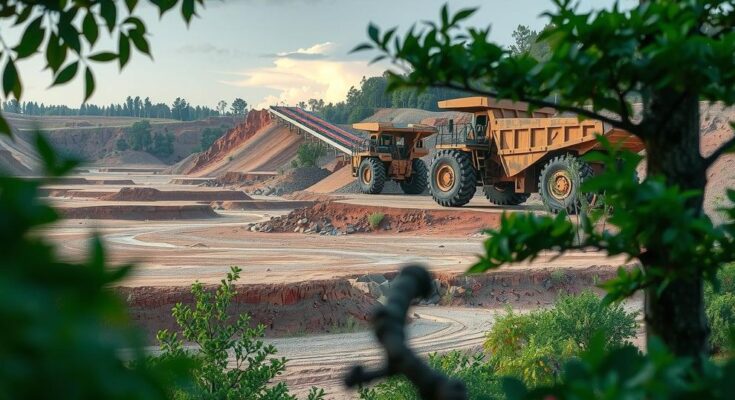Chinese mining operations in the Democratic Republic of Congo’s Okapi Wildlife Reserve are causing severe environmental damage and threatening local wildlife. These operations, conducted by Kimia Mining Investment, have violated international laws and led to significant ecological degradation and socio-economic harm. The situation reflects a broader trend of resource exploitation by foreign companies, often at the expense of local communities and ecosystems.
In the Ituri province of the Democratic Republic of Congo, the Okapi Wildlife Reserve, a critical UNESCO World Heritage site, faces severe environmental degradation from Chinese mining operations. These activities have violated both international protection standards and local laws, systematically transforming the previously pristine landscape along the Ituri River into an industrial mining complex run by Kimia Mining Investment. This situation highlights the rampant resource colonization occurring across Africa, even within designated protected areas.
The initiation of these mining operations resulted from a controversial redrawing of the reserve’s boundaries, which has controversially permitted mining within the area that was previously off-limits. Authorities have claimed adherence to official maps; however, the ICCN, the entity responsible for managing protected areas in Congo, firmly asserts that the original boundaries must be preserved, indicating possible misconduct in the boundary alteration process.
The ecological fallout from the mining is alarming, going beyond evident deforestation. Former Kimia Mining employees have alleged the use of mercury in gold extraction processes, leading to significant contamination of water sources and soil. The abandonment of mining pits poses significant hazards for both local wildlife and communities, resulting in severe declines in crop yields for adjacent farmers, further heightening the crisis.
With approximately 15% of the global okapi population residing in the Okapi Wildlife Reserve, the ongoing mining threatens their survival. As mining operations expand, poaching has escalated, leading to a decline in the availability of game animals for local hunters. This once-thriving environment for sustainable hunting has devolved into an industrial wasteland, massively impacting local livelihoods.
The situation in Congo reflects a disturbing trend of Chinese resource exploitation. Recently, 17 Chinese nationals were arrested in South Kivu Province for operating illegal gold mines, underscoring the pervasiveness of such unauthorized activities that disregard necessary documentation and environmental precautions, further harming local populations.
The socioeconomic implications of this exploitation are dire, as local communities that once depended on traditional mining and agriculture have seen their livelihoods obliterated. Kimia Mining’s exorbitant fees for locals wishing to mine leftover materials have compounded these issues, forcing many individuals into poverty. This reality echoes China’s broader strategy exemplified by the 2008 Sicomines agreement, which largely benefitted Chinese companies while delivering minimal infrastructure investment to the DRC.
Between January and May, over 480 hectares of forest were lost within the reserve, an area comparable to 900 American football fields. This deforestation endangers not only local biodiversity but also poses a significant threat to global climate stability, as the Congo Basin rainforest is a critical carbon sink. Despite assertions of adherence to environmental standards, the actions of Kimia Mining contradict these claims, as revealed by their spokesperson’s remark that Congo “can’t place a higher value on the environment than on mining.”
The Democratic Republic of Congo, home to rich natural resources, has been a focus of international exploitation, especially by Chinese companies. This exploitation often occurs in critical wildlife habitats, leading to extensive environmental degradation. The Okapi Wildlife Reserve is a UNESCO World Heritage site, protecting rare species, including the endangered okapi. However, unchecked mining activities have threatened its ecological integrity while violating laws intended to preserve such areas. The complexities of local governance and international agreements further exacerbate the situation, calling for urgent attention to protect both the environment and local communities.
The destructive mining operations in Congo’s Okapi Wildlife Reserve represent a significant environmental crisis exacerbated by invasive foreign interests. The disregard for established boundaries and environmental laws, combined with the adverse effects on local communities and ecosystems, illustrates a broader pattern of exploitation prevalent in the region. Immediate measures are essential to rectify these practices and safeguard the vital natural resources and wildlife of the Democratic Republic of Congo.
Original Source: allafrica.com




